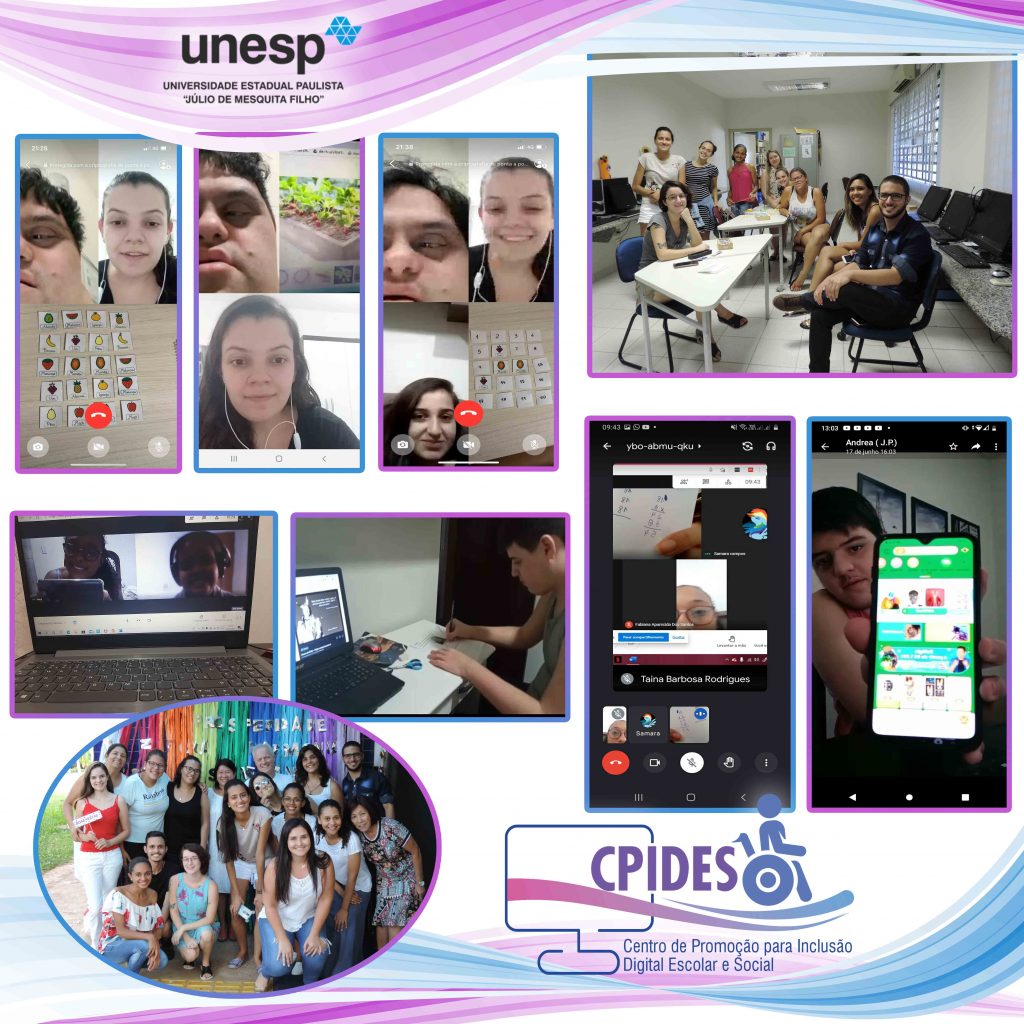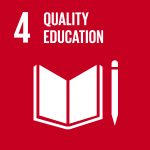Esta web utiliza cookies para que podamos ofrecerte la mejor experiencia de usuario posible. La información de las cookies se almacena en tu navegador y realiza funciones tales como reconocerte cuando vuelves a nuestra web o ayudar a nuestro equipo a comprender qué secciones de la web encuentras más interesantes y útiles.
The PIBID Inclusive Education Project and SDG4: Paths to Inclusion and Equity in the Work of Future Teacher
Description
Institution
São Paulo State University

Organizations/areas of the university involved
Center for Promoting Digital, School and Social Inclusion (CPIDES) – São Paulo State University (Unesp)
Country
Brazil
The PIBID program is an action to train future teachers through the development of activities together with teachers from Brazilian public schools with people with disabilities included in common classrooms.
The Center for the Promotion of Digital, School and Social Inclusion (CPIDES), of the São Paulo State University (Unesp), has been carrying out teaching, research and extension activities for more than eleven years aimed at the inclusion of Special Education Target Students (EPAEE).
CPIDES researches the development of inclusive practices in different areas, mediated by the use of Digital Information and Communication Technologies (DICT), active learning methodologies and the Constructionist, Contextualized and Meaningful Approach (CCM), defined by Schlünzen (2015).
In order to collaborate for the effectiveness of the current Brazilian educational policies that deal with the right of EPAEE to have access and permanence conditions in educational institutions, the actions are developed by CPIDES in partnership with the Institutional Program for Teaching Initiation Scholarships (Pibid) linked to CAPES, a foundation linked to the Ministry of Education of Brazil. PIBID is a Brazilian program that aims to initiate the teaching of undergraduate students who do internships in public schools, making an articulation between higher education, the school and the education systems.
The Pibid project considers the challenge of presenting practical solutions for inclusive education in different contexts, national and international, contributing to the Sustainable Development Objective, SDG 4. The CPIDES project linked to PIBID is intended to encourage the initial training of teachers at a higher level for basic education, providing them with opportunities to create and participate in methodological, technological and practical experiences from the perspective of Inclusive Education, as advocated by the National Policy on Special Education from the perspective of Inclusive Education (BRASIL, 2008). Currently, we have undergraduate students working remotely with teachers from Brazilian public schools in activities with their students who make up an inclusive class, with people with disabilities included.
The role of graduates is to assist teachers in the development of inclusive activities through DICT in a remote context and with included students. So far, there are important results of inclusion in activities that are being carried out remotely.
Results and impact measured or expected
One of the greatest difficulties faced in the training of future teachers is in offering concrete opportunities for articulation between theoretical and practical knowledge, necessary for teacher training to understand how we can build inclusive education in schools.
The PIBID project develops activities, strategies and materials to promote knowledge related to the teaching and learning process of students in classes with people with disabilities included, with a view to developing a work in a globalized perspective, dissociated from the traditional environments that present content in a way fragmented, distant from the reality and contexts of the students.
We can conclude that with the assistance provided by scholarship students from the PIBID Inclusive Education program at Unesp and the collaborative work between teachers from the benefited schools and the university, a collaborative training network has been established, both for the students and in service for the teachers.
Connection with the SDG framework
Special Education from the perspective of Inclusive Education, undoubtedly, articulates with SDG 4, as it aims to ensure inclusive, equitable and quality education, and to promote lifelong learning opportunities for all, based on the principles defended by the approach Constructionist, Contextualized and Meaningful (CCM). With it, teachers and students work in an environment (face-to-face or remote) in which they build knowledge by engaging in activities in which there is the elaboration of something concrete, in the context of the students’ lives and whose result has meaning for the students’ learning .
Thus, through the Pibid Inclusive Education Project, undergraduate students, still in the process of initial training, learn to build and apply didactic activities and strategies appropriate to the reality and diversity of basic education students in Brazil, especially in the current provoked scenario by the Covid-19 pandemic.
Barriers and follow up
One of the biggest challenges faced by scholarship students concerns the lack of interaction existing in the relationship between family and school in the educational process. Thus, we consider it essential to establish an inseparable relationship between family and school, through dialogue, collaboration and the sharing of responsibilities in order to ensure quality education for students.
In addition, another complicating factor found is the access and use of DICT by students, which, in turn, requires the search for new strategies that ensure the participation of all students in the educational process.
Such difficulties reveal the importance of developing a work articulated with the context and the specificities of the students, articulating the theoretical and practical knowledge, necessary for teacher education for a more inclusive, contextualized, meaningful and quality education for all students.
Transferability of the initiative
The project can be carried out in other geographical and university contexts, as has already been shown in the actions developed by CPIDES in partnership in different regions of Brazil and other countries such as the USA and Portugal.
Higher education institutions must commit to contexts for the development of initial and continuing education projects. PIBID-Unesp is an example of affirmative action aimed at creating training environments based on proposals that integrate the initial and continuing training of teachers, committed to the promotion of inclusive, equitable and quality education for all. With this, we will be able to significantly increase, in the near future, the number of inclusive projects, which will have, in an average time, reflections in basic education schools in the world.
Education 4 SDG funciona gracias a WordPress

